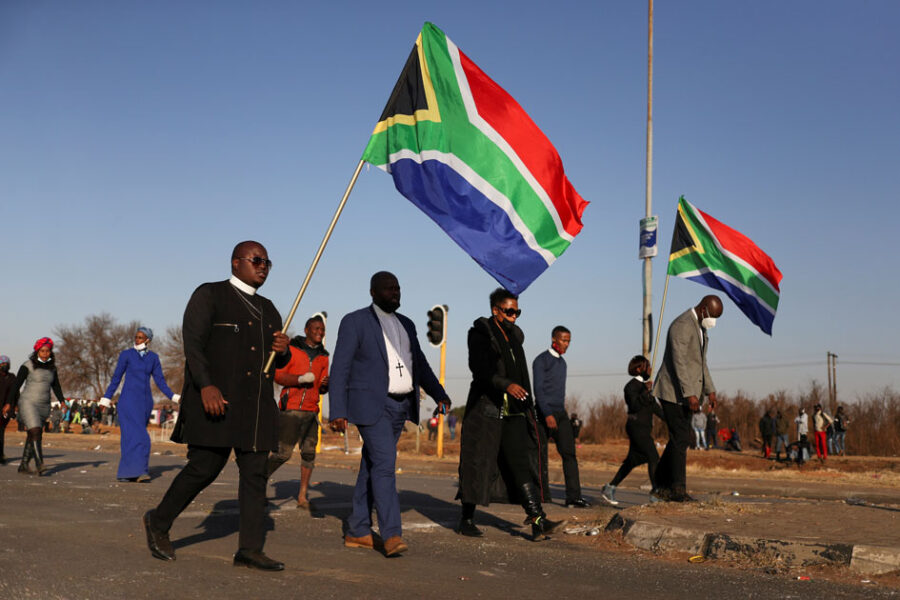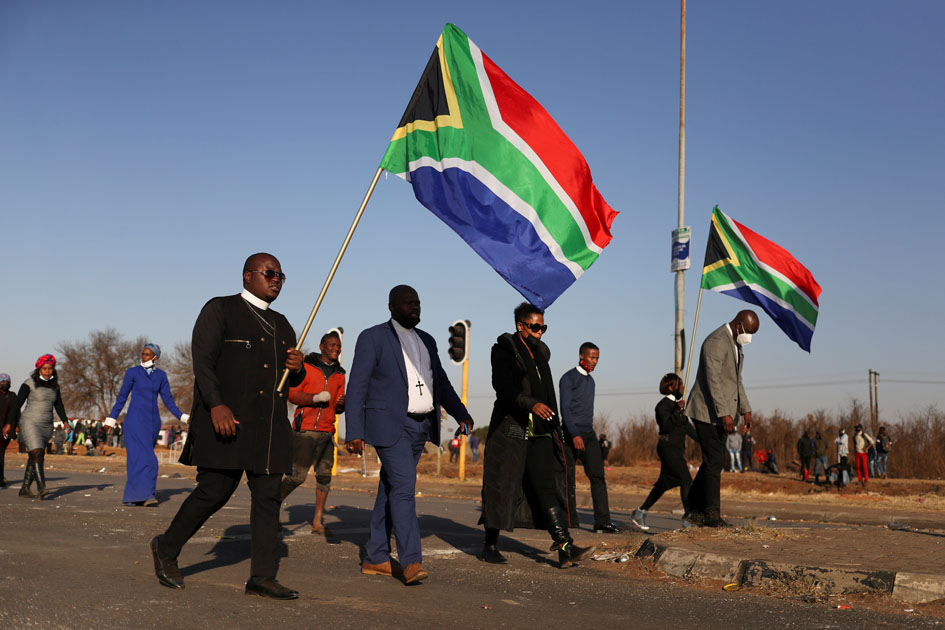
South Africa Plans to Deploy 25,000 Soldiers. SANDF Army to Quell Unrest After Day in Which Teen Died
DURBAN, South Africa (Reuters) – South Africa plans to deploy up to 25,000 extra soldiers in Gauteng and KwaZulu-Natal (KZN) where security forces are struggling to quell days of looting, arson and violence, its defence minister told a parliamentary committee on Wednesday, according to local news channel eNCA. A military surge of that size would […]

DURBAN, South Africa (Reuters) – South Africa plans to deploy up to 25,000 extra soldiers in Gauteng and KwaZulu-Natal (KZN) where security forces are struggling to quell days of looting, arson and violence, its defence minister told a parliamentary committee on Wednesday, according to local news channel eNCA.
A military surge of that size would increase tenfold the number of soldiers deployed in the hot spots of those two provinces, where the police and army have been battling unrest for days.
“We have now submitted a request for deployment of (about) 25,000 members,” according to a video recording of Defence and Military Veterans’ Minister Nosiviwe Mapisa-Nqakula shown on eNCA.

SA Army Reserve members to report at first light, Operation Prosper to last 3 months
On Wednesday evening the SANDF posted urgent messages on its social media pages for the immediate reporting to units of the SA Army Reserve members. The statement said: “As directed by the Chief of the South African Army, Lieutenant General Lawrence Khulekani Mbatha, all Reserve Members are to report for duty at First Light tomorrow morning 15 July 2021 at their respective units. The members to report ready with their necessary equipment.”
President Cyril Ramaphosa had mentioned at a meeting with political party leaders earlier on Wednesday that a further deployment of members of the SANDF was being considered. There had been calls from several quarters, including from Democratic Alliance (DA), and the international South African community, for more soldiers to be deployed to handle the SA unrest.
Late Wednesday night, the SANDF posted a link to the Government Gazette in which a notice from the Ministry of Defence announces ‘Operation Prosper‘ which runs for three months from now until 12 October 2021. It includes the employment of the SANDF with the SA Police Service in the “Prevention of Crime and Maintenance and Preservation of Law and Order”.
DA welcomes additional deployment of 25,000 SANDF members
In a statement on Wednesday night, the DA’s Leader in KZN, Francois Rodgers, said the additional deployment from Thursday is welcomed to “quell the anarchy and looting”. The rollout will include mechanized vehicles and helicopters.
Rodgers said: “This additional deployment of resources is the result of continued pressure by both the DA leadership in KZN, our Federal Leader, John Steenhuisen, and our National Assembly counterpart, DA Shadow Minister of Defence, Kobus Marais.
“Our provincial SAPS have clearly not been in a position to deal with the destruction. Neither has KZN Premier, Sihle Zikalala, who until his appearance today has been watching the anarchy from the shadows.”
Rodgers accused the KZN Premier of ignoring the plight of the province’s residence because “his sole aim has been to secure the release of former President Jacob Zuma”.
What caused the violent protests in parts of South Africa?
Triggered by the jailing of ex-president Jacob Zuma last week, after he failed to appear at the Zondo commission of inquiry, protests have widened into an orgy of looting and an outpouring of anger over the hardship and inequality that persist in South Africa 27 years after the end of apartheid.

More than 70 people have been killed in the unrest, the worst in South Africa for years, and hundreds of businesses wrecked. Food and fuel supplies are running short.
Shopping malls and warehouses have been ransacked or set ablaze in several cities, mostly in KZN where Zuma lives, especially in Durban, and in SA’s financial and economic centre Johannesburg and surrounding Gauteng province.
Public backlash against protestors
But in signs of a public backlash, residents in some areas on Wednesday turned in suspected looters to police, blocked entrances to malls and in some cases armed themselves as vigilantes to form road blocks or scare them away.
In Vosloorus, southern Johannesburg, minibus taxi operators, many of whom have guns, fired bullets into the air to scare off looters.
“We can’t just allow people from nowhere to come and loot here,” said Paul Magolego, Vosloorus taxi association spokesperson, adding that taxi drivers had had no business since Monday because of the unrest.
Teenager tragically killed by stray bullet in Vosloorus
Underscoring the inherent dangers in such vigilantism, a 15-year-old teenage boy – Vusi Dlamini – was killed by a stray bullet in Vosloorus, according to a Reuters photographer who saw the body. Magolego said the taxi owners arrived on the scene after he had died.

Stolen goods retrieved by soldiers
In Alexandra township in northern Johannesburg, one of the city’s poorest neighbourhoods, a Reuters correspondent saw soldiers moving door-to-door to confiscate stolen items, with the help of civilians opposed to the looting.
Citizens armed with guns, many from South Africa’s white minority, blocked off streets to prevent further plundering, in Durban, Reuters TV footage showed.
Others were forming online groups like Rebuild South Africa to help clean up and rebuild devastated neighbourhoods.
‘WE HAVE NOTHING’
Security forces say they have arrested more than 1,200 people, while President Cyril Ramaphosa met political party leaders on Wednesday to discuss the unrest.

Violence abated in some areas, but renewed in others
The violence appeared to have abated in some areas, but in others, there was renewed burning and looting.
Some rich Durban residents chartered small planes and helicopters out of the city, a Reuters photographer reported.
Deeper root causes of SA unrest
Though triggered by Zuma’s imprisonment, the unrest reflects growing frustration at failures by the ruling African National Congress to address inequality decades after the end of white minority rule in 1994 ushered in democracy.
“It’s not about Zuma, it’s about poverty,” a man who gave his name as Elijah said, as soldiers confiscated stolen items from his house in Alexandra.
“I grabbed things I could take like those cold drinks and some paint. I guess the real reason is because we actually have nothing.”

Half the population lives below the poverty line, according to the latest government figures from 2015, and growing joblessness since the coronavirus pandemic began has left many desperate. Unemployment stood at a new record high of 32.6% in the first three months of 2021.
SA unrest affects hospitals, food and fuel supplies
The unrest also disrupted hospitals struggling to cope with a third wave of COVID-19.
The National Hospital Network (NHN), representing 241 public hospitals already under strain from Africa’s worst COVID-19 epidemic, said it was running out of oxygen and drugs, most of which are imported through Durban, as well as food.
“The President also cautioned that several areas of the country may soon be running short of basic provisions following the extensive disruption of food, fuel and medicine supply chains,” said the Presidency.
The Acting Minister in the Presidency, Khumbudzo Ntshavheni, called for calm and asked South Africans to resist the urge to stock up on supplies, and to avoid spreading COVID-19. Ntshavheni said while the government understood the concerns of people who have taken up arms to defend their property, she asked them to rather stick to the law and work with law enforcement than resorting to vigilantism.
The mayor of Ethekwini, a municipality that includes Durban, estimated that R15 billion ($1 billion) had been lost in damage to property and another billion in loss of stock.
Zulu king’s appeal
“I appeal to the Zulu nation to withdraw from the participation in the destruction of our country,” The Zulu King Misuzulu said in an address – many of the affected areas are predominantly Zulu, the nation to which Jacob Zuma belongs.
Zuma, 79, was sentenced last month for defying a court order to give evidence at an inquiry investigating high-level looting during his nine years in office until 2018.
He has pleaded not guilty in a separate case on charges including corruption, fraud, racketeering and money laundering.
(Additional reporting by Jenni Baxter/SAPeople and Nqobile Dludla, Olivia Kumwenda-Mtambo, Tanisha Heiberg, Promit Mukherjee, Alexander Winning and Tim Cocks in Johannesburg, and Wendell Roelf in Cape Town; Writing by Tim Cocks / Reuters and Jenni Baxter / SAPeople; Editing by Angus MacSwan and Toby Chopra / Reuters and Jenni Baxter / SAPeople)
